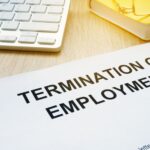Termination for Just Cause – No Mask No Job?
Reading Time: 2 minutesWhat is Just Cause?
Generally speaking, an employer has the unfettered right to dismiss an employee at any time with or without “just cause”. Dismissal for cause occurs when an employee is terminated for a reason related to an employee’s conduct. If an employer has “just cause” to dismiss an employee, the employer is not legally required to provide the employee with reasonable notice of termination. Examples of just cause include serious misconduct such as theft, habitual neglect of duty, incompetence or willful disobedience.
The Role Played by Masks
Social interactions and close contact in the workplace are associated with the risk of an outbreak of COVID-19 in a workplace constitutes a health hazard under the Public Health Act.
According to the BC Centre for Disease Control (the “BCCDC”), masks have a role to play in preventing the spread of COVID-19; masks act as a barrier and help stop the spread of droplets from a person’s mouth and nose when talking, laughing, yelling, singing, coughing or sneezing. Wearing a non-medical cloth mask is now required in many indoor public spaces by people 12 years and older. This includes, but not limited to, shopping malls, grocery stores and public transportation.
Mandatory Mask Wearing
In a provincial state of emergency, the Provincial Health Officer can make orders as needed. On November 24, 2020, the Minister of Public Safety and Solicitor General issued an order (the “Order”) requiring everyone to wear masks in all public indoor settings and workplaces. Workers are required to wear a non-medical cloth mask that covers the nose and mouth in all indoor public spaces. There are exemptions for:
- People with health conditions or with physical, cognitive or mental impairments who cannot wear one
- People who cannot remove a mask on their own
- Children under the age of 12
Additionally, employers have prepared a masking policy as part of their duty to protect their employees and provide them with a safe workplace. WorkSafeBC has issued guidelines recommending that employers consider whether updates to their COVID-19 Safety Plan are appropriate.
Refusal to Wear a Mask
An employee must comply with protocols in their employer’s COVID-19 Safety Plan which may include the use of masks for all their job duties. If an employee refuses to wear a mask contrary to an employer’s masking policy, the employer can discipline that employee. Whether or not that discipline amounts to dismissal for cause will depend on the conduct of the employee. Context is always key. An employee may have a disability that prevents them from wearing a mask which might include a respiratory disease.
If after reading this post you need assistance on drafting a COVID-19 Safety Plan appropriate to your workplace, or you require advice on termination, please contact Michelle Quinn or any one of our Employment and Human Rights Lawyers.
-
The BC Pay Transparency Act (the “Act”) was passed on May 11, 2023, and aims to combat systematic discrimination and work towards eliminating gender-based disparities in BC’s workforce. The updated Pay Transparency Regulation sets out clear guidelines for employers to follow when compiling pay transparency reports. In this post, we provide some guidance for navigating pay transparency reports.
-
The practice of adopting vaccine mandates for employees in BC has advanced considerably from where we were even a couple of months ago. While there have been no changes in the applicable legislation (for example, no amendments to the BC Employment Standards Act, the BC Human Rights Code or the Workers Compensation Act to explicitly permit employer vaccine mandates), a large number of employers have now moved forward with implementing a vaccine mandate.







